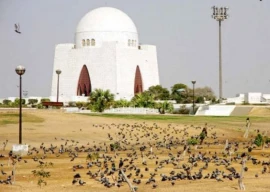
“Here you never know when people will start burning shops and killing people,” says the 29-year-old.
Gulistan-e-Jauhar, which started out as a middle-class rabbit’s warren of apartment buildings in the late 1990s, has become one of the least safe neighbourhoods in the city. Over the course of a week, a fair share of the target killings and violence has taken place here as young men from political parties slug it out in an ever-escalating turf war. Invariably, whenever the target killings surface in Karachi, the violence starts in this neighbourhood.
Drive-by shootings and open shoot-outs are increasingly common in the area as different ethnic communities, Sindhis, Pakhtun, Urdu speakers and Baloch, battle it out. Businessman Ali Imran says that while they have suffered from the political violence, it is not limited to one particular community. “When there is violence, no one can operate in the area,” he argues.
Gulistan-e-Jauhar is spread over 19 blocks - 1 to 7 are mostly occupied by Sindhi, Baloch and Punjabi people. Blocks 12 to 16 are generally considered the posh part as villas and luxury apartments have sprung up there. Blocks 17, 18 and 19 have gone commercial with restaurants, motels, general stores and grocery shops.
While the neighbourhood is a stronghold of the Muttahida Qaumi Movement the Pakhtun-backed Awami National Party has garnered some support in the commercial blocks where businesses and restaurants are ethnic Pakhtuns. The Urdu-speaking community is in majority in the area and these families are mostly middle and lower-middle class.
In particular, blocks 17 to 19 have always been tense because of frequent clashes between ANP and MQM workers. The strip from Jauhar Chowrangi to Rabia City resonates with shots being fired and its streets are blackened by burnt vehicles when violence erupts.
At a five-minute drive from Gulistan-e-Jauhar is the Pakhtun-dominated Pehlawan Goth where many restaurant owners and businessmen live. Muhammad Jibran, who lives in block 14, says that usually the violence is limited to the Rabia City area. However, he has told his sons not to sit at the tea shops or restaurants or go shopping after 10 pm. “Anything can happen at any time in Jauhar,” he says. “People are suffering because of dirty politics.”
Pakhtun restaurant owners lament that they are paying the price for a tug of war even though many of them don’t have political affiliations. Some residents of Rabia City said that the problem is that the political workers gather at the restaurants and tea shops or visit the markets. “We don’t go to the shops at night any more,” says Zainab, 45, a resident of block 17. “The people of Pehlawan Goth are responsible for this crisis.”
Published in The Express Tribune, July 25th, 2010.
1731570357-0/elon-musk-(1)1731570357-0-405x300.webp)
-(1)1717678110-0/Kendrick-(1)-(1)1717678110-0-165x106.webp)






1732428532-0/BeFunk_§_]__-(43)1732428532-0.jpg)








COMMENTS (2)
Comments are moderated and generally will be posted if they are on-topic and not abusive.
For more information, please see our Comments FAQ